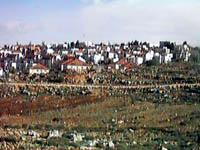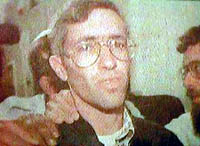While sitting with friends in my house in Ramallah at around 8:30pm after a day's work at the university, I hear voices outside calling, "Nigel...Najeeb...Nigel!" It's the shebab ('guys') from the Computer Center, trapped by a yet another checkpoint at the settler bypass road near Surda, the setting for many previous diary entries.
In fact there are two checkpoints, a Palestinian Police checkpoint just before it inside the northern Area "A" border of Ramallah and an Israeli checkpoint just outside. The shebab live on the other side of both, in Birzeit village, so they are likely to be spending tonight with friends in Ramallah.

They reported hearing sirens earlier, and the combination of Israeli and Palestinian checkpoints suggests that there has been an amaleeyyah ("operation") near Beit El settlement (right). In fact, the last time we saw joint checkpoints there enforcing a closure was in May, when a settler was killed while standing at a bus stop outside Beit El.
It was therefore pretty safe to assume that something similar had happened. This was confirmed later, when we heard that a car had been ambushed on the settler road, just over one year after a similar incident near the same spot.
We had been expecting it. Each time we pass the glistening black slice out of the valley floor, I have been prophesying to anyone unfortunate enough to be in the same car as me that blood will be spilled on that settler road.
For starters, the road is a security nightmare. Built by an Israeli settler community obsessed with their security, one wonders at the glaring stupidity inherent in the construction of a road on confiscated Palestinian land, that runs along the bottom of a valley with rolling hills on either side of it. A perfect place for snipers to anonymously pick off the settlers cars below, never mind drive-by shootings on the long, dark winding road, far from earshot.
The settlement at Beit El ("Bethel" from the Bible, the site where Jacob had his dream) has attracted high numbers of religious settlers, who have established a yeshiva (Jewish religious school) and a unpleasantly right-wing radio station called Arutz Sheva ("Channel Seven").
This brand of settlers are cut from a whole different mould than those, say, in secular Ariel (west of Nablus) which is advertised as a dormitory suburb of Tel Aviv. These settlers manifest the profound arrogance common to religious extremists, and regularly and openly express a disturbing contempt for the humanity of the Palestinian population, discussed in a previous entry written after a visit to Beit El during the December 1995 Israeli redeployment from Ramallah.
This environment produces the kind of people who, rather than using the new redeployment-inspired bypass road that halved their travelling time to Tel Aviv, continued for several days to drive through Ramallah, Israeli flags hanging out of their cars, all to communicate to the Palestinian population that God gave the Jews - not them - all of the land including Ramallah.
In Arabic, "Ramallah", actually "Ram Allah" as it is two words, means "Hills of God", and it would seem obvious from the amount of Palestinians happily living in its city limits who God has given it to. The handful of Israeli settler cars that actually use the bypass road since redeployment often choose to do without an Israeli military escort, as if unaware that the Palestinian population are not avid supporters of their land expropriation and racist arrogance towards them.

Settlement security chief Nahum Korman (pictured left) is from Hader Betar, another Jewish residential installation situtated to the west of Beit Jala, near Bethlehem. On October 27th, Korman kicked and, with his gun butt, beat to death 11-year-old Hilmi Shoushi, a Palestinian child from inside the Green Line on his way home from school. In an initial statement by 'Judea and Samaria' police spokeman Boaz Goldenberg, one of the first and most telling questions that arose was whether there had been "any Jewish witnesses".
As Korman killed Hilmi in front of several Palestinian villagers, there was no shortage of Palestinian witnesses. They reported that the boy was simply walking along with two friends when Korman's four-wheel drive vehicle sped into the village of Husan and he jumped out to chase after them on foot. Earlier, stones had been thrown at settlers' cars and Korman seemed to be out for retribution, as he certainly had not seen Hilmi or anyone else throw a stone.
An article in the Friday 1 November 1996 edition of the Israeli Yediot Aharnot newspaper quoted Korman as saying, "Not only didn't I kill the boy, but I did the utmost to save his life." His lawyers denied he hit the boy at all. His brother, Ya’acov, stated that Nahum's own children had been stoned as if that was somehow relevant and that he "believed in [his] brother's goodness."
Korman was later remanded and charged with manslaughter. He'll be out of jail before any Palestinian currently serving time for a comparible crime, that's for sure. Israeli women protestors outside the 1 November hearing carried placards quoting from Bialik: "The devil has not created a revenge for the blood of a small child."
[Editor's Note: Judging by the January 2001 conclusion to this incident, neither has the Israeli court system. More commentary about how the incident was covered in the Israeli press, written on 13 December 1996, can be found here. Finally, read the Israeli justice system's final conclusion about the Korman killing (added 30 Jan 2001, opens in new browser window).]
A few weeks ago as I was passing the Ramallah bypass road, a settler car waited to cross the Ramallah-Birzeit road. There were no military vehicles, no checkpoints at this strategic node whose introduction the Palestinian Authority unthinkingly agreed to in the Oslo 2 negotiations.
The car's sole occupant, a 30-something Jewish woman wearing a broad-rimmed red hat styled more suitably for watching the horse races at Ascot, seemed dressed to underline her privledge as one of the West Bank's first class citizens. As she accelerated unconcerned across the road and down the valley bypass road towards Tel Aviv, she clearly did not feel it important to consider the resentment felt by those whose path she had just crossed.